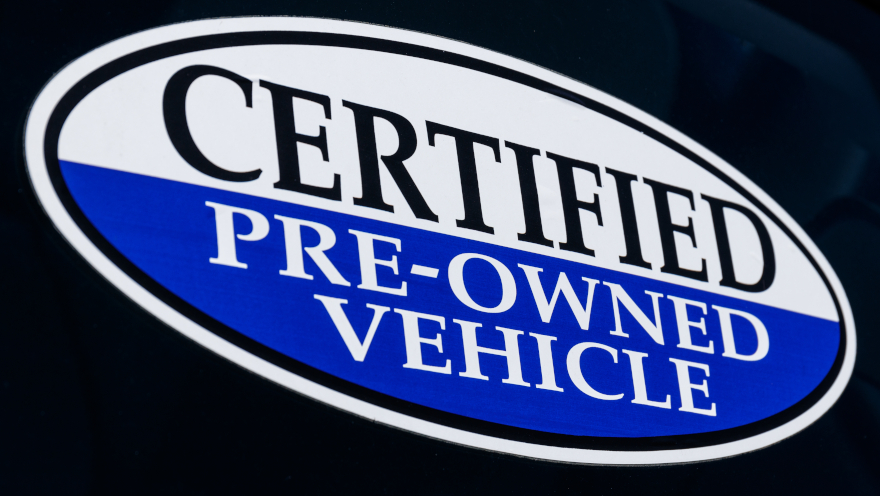Best CPO January in 10 years

By subscribing, you agree to receive communications from Auto Remarketing and our partners in accordance with our Privacy Policy. We may share your information with select partners and sponsors who may contact you about their products and services. You may unsubscribe at any time.
CARY, N.C. –
It has been a decade since the certified pre-owned vehicle market began the year with these kinds of numbers.
A Cox Automotive Data Point report, citing Motor Intelligence, indicates there were 215,959 CPO sales last month. Not only is that an 8% year-over-year gain, it’s the best January for CPO sales since 2010, Cox Automotive said.
Automakers are paying attention, the company said, pointing to Honda and Acura — which enhanced their programs with additional consumer perks in 2019 that helped them crack Autotrader’s 10 best CPO program list — as well as Mazda, as examples.
“This year, American Honda launches a national ad campaign, including television ads and a social media program, to promote Honda and Acura CPO to attract consumers frozen out of the new-car market due to affordability issues and to help their dealers be more profitable,” Cox Automotive said in the analysis.
“Similarly, Mazda launches Mazda Finance on April 1, in part, to address the surge of off-lease volume coming back to the market.”
Specifically, Cox is projecting another 4.1 million vehicles coming off lease this year, which is consistent with last year. This gives consumers a “high-contented” selection of late-model pre-owned vehicles, perhaps even as a substitute for higher priced new vehicles with similar equipment, Cox said.
Subscribe to Auto Remarketing to stay informed and stay ahead.
By subscribing, you agree to receive communications from Auto Remarketing and our partners in accordance with our Privacy Policy. We may share your information with select partners and sponsors who may contact you about their products and services. You may unsubscribe at any time.
After nine consecutive years of record CPO sales, the company is projecting a “strong” year for certified, given new-car affordability, off-lease supply and an “improving” lineup of CPO vehicles, as the consumer-favored SUVs gain a broader share of off-lease volume.
Overall, even beyond certified, the used-car market appears to have made a solid start to the year.
Over at TrueCar’s ALG division, analysts were expecting just a shade under 3.7 million used-car sales for February. That would beat year-ago figures by 6% and mark a 12% hike from January.
Late last month, ALG had projected a 6% year-over-year rise in used-vehicle sales for January, forecasting a monthly sum of 3,329,070 units sold (also up 12% month-over-month).
Typically, right now is when the pre-owned market starts to “lift off,” Cox Automotive chief economist Jonathan Smoke wrote in his latest “Smoke on Cars” report.
He explains the dynamic further in this report, but suffice to say that in recent years, the ninth week of the year has been when the IRS has distributed about half of tax returns.
Current IRS data only goes back to Feb. 7, he explained, but at that point only 20% (approximately) of tax returns had been distributed. Not to mention, there had been a 0.4% dip in tax return filings and a 4.8% decrease in returns.
Not to panic, though. Cox Automotive expects, based on growths in the labor market, wages/income and tax withholdings, that total refunds and average refund amount will best year-ago figures once the IRS hits that 50% threshold.
And then, you can expect a seven- to nine-week spring market for used cars, Smoke said.
The used retail market has yet not had the typical bounce this year, but the market could be approaching a “pivotal week,” he explained.
“We have observed that retail used-vehicle sales through week 8 this year have not yet exhibited the characteristic jump that signals the beginning of the key buying period. Week 8, which ended this past weekend, was on par with where it was at the same point last year,” Smoke writes.
“This year the volume trend has been flat recently when last year the market was starting to see growth, but the change last year was a result of a recovery from very weak sales to start the year,” he said.
“Weather has been very different this year compared to last year. Warmer January weather this year has led to a stronger pace of sales to start 2020. As a result, we had more activity earlier, and recent weeks have been relatively slower,” Smoke added. “However, the pace is now about where it was last year as we reach the pivotal week when tax refunds should lead to increasing sales.”
Cox Automotive is forecasting 39.4 million total used-vehicle sales this year, down from an estimated 39.6 million in 2019, the company said in a January analysis earlier this month. That sum includes both used-vehicle sales by dealers as well as those between private parties.
Retail used-vehicle sales, which Cox Automotive defines as those made by franchised or independent dealers, are expected to rise from an estimated 20.0 million in 2019 to 20.3 million in 2020.
The National Automobile Dealers Association is calling for 39.5 million used-car sales this year, which would be flat year-over-year.
NADA said in a January analysis that affordability issues on the new-car side, along with robust used-car inventory levels, have some consumers moving from new to used.
“As affordability remains a challenge, more consumers chose used vehicles in 2019,” NADA chief economist Patrick Manzi said in the analysis. “New cars are getting too expensive for many consumers. Even consumers with great credit or the ability to buy new are instead choosing a used vehicle.”
Within the CPO market, specificially, Cox Automotive is forecasting 2.80 million sales, which would be even with 2019.
Edmunds, however, said in its 2020 Automotive Industry Trends Report that it is forecasting 2.81 million certified sales. That would beat what Edmunds said were 2.78 million CPO sales in 2019 and represent a new best-ever sum.


